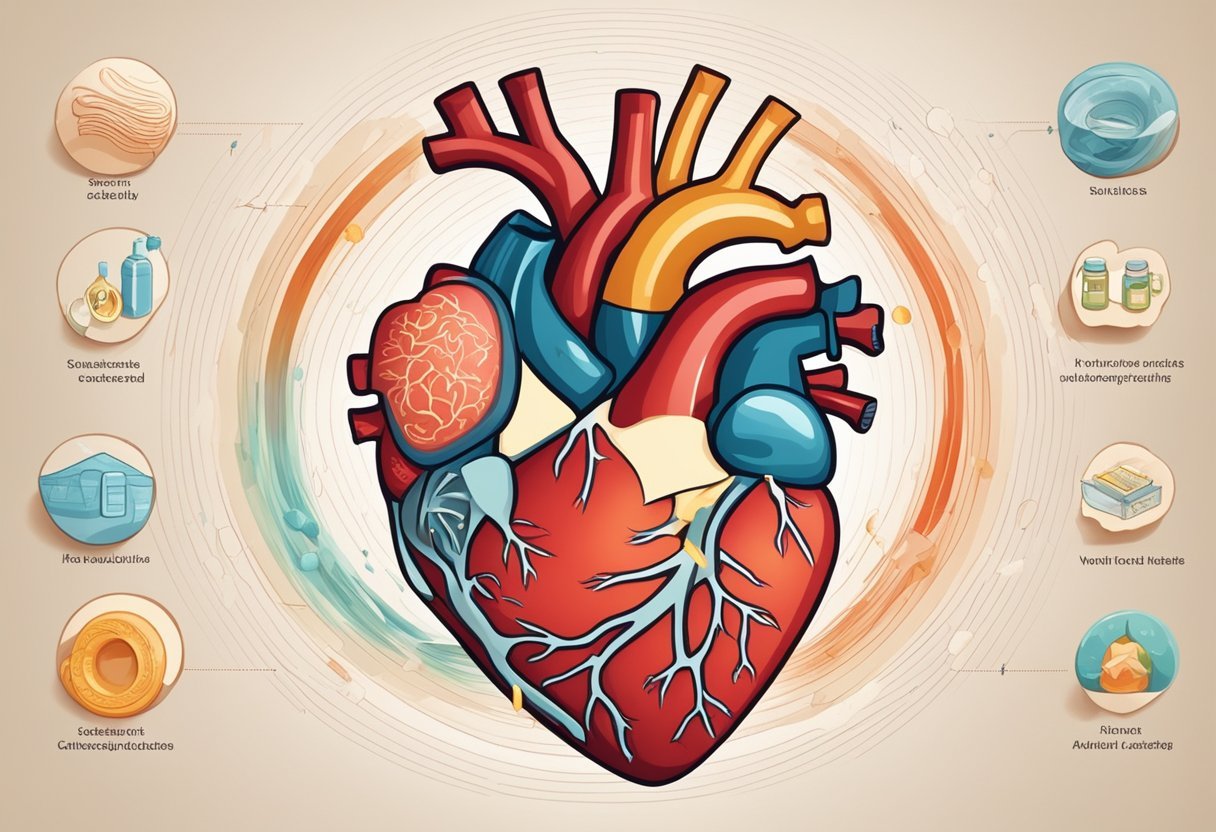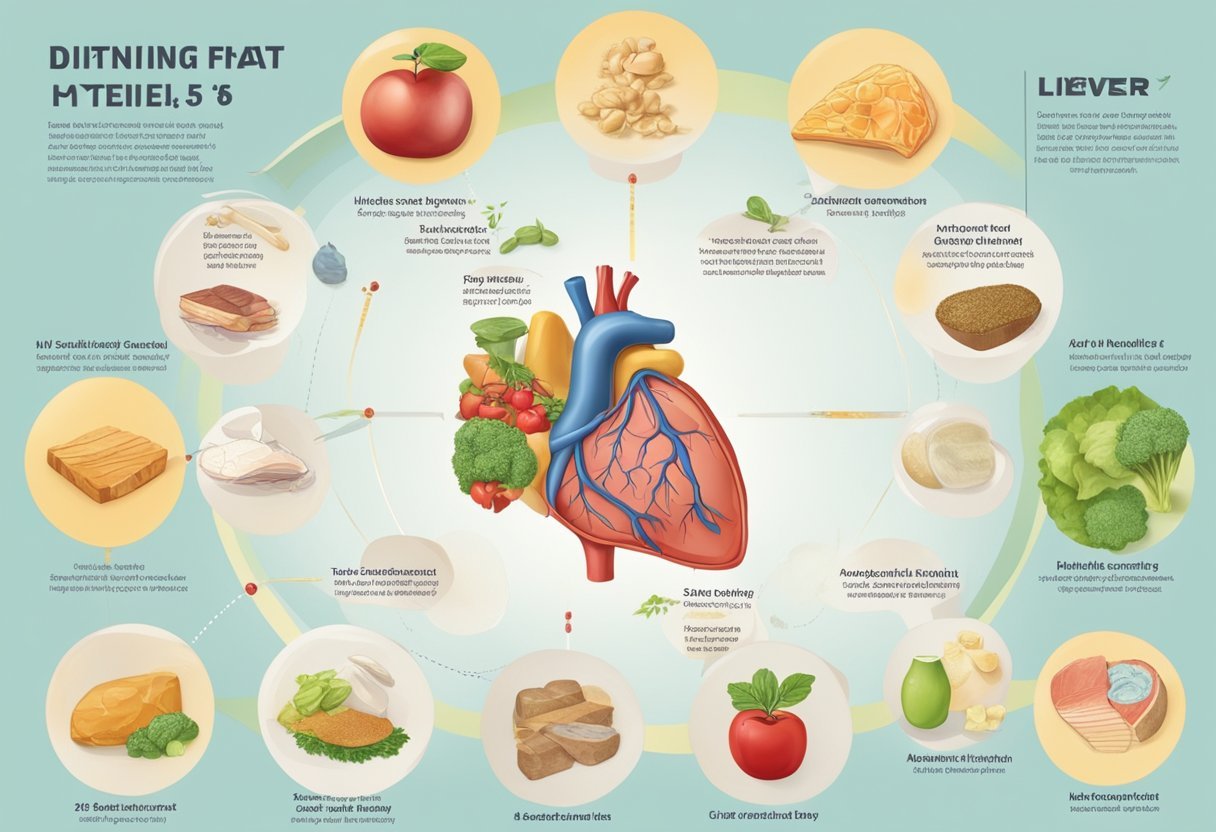Understanding How Animal Fats Support Healthy Metabolism
April 18, 2025 | by iprittie@gmail.com

Beef tallow has made a comeback in cooking circles, but many people wonder about its effects on heart health.
For decades, beef tallow has been unfairly blamed for cardiovascular risks. But are traditional fats and heart disease really linked the way we’ve been told? This post explores what science says about beef tallow for cardiovascular health — and whether it deserves a second look.
The cooking fat, rendered from beef fat, contains about 50% saturated fat, which has traditionally been linked to increased heart disease risk. However, recent nutritional research suggests the relationship between saturated fats and heart health may be more complex than previously thought.

Not all saturated fats affect the body in the same way, with some types found in tallow (like stearic acid) potentially having different effects on cholesterol levels than other saturated fats. While some nutrition experts warn about tallow’s high saturated fat content and potential inflammatory properties, others point to traditional diets that included these animal fats without today’s rates of heart disease. This nuanced understanding challenges the simple “all saturated fat is bad” narrative that dominated nutrition advice for decades.
When evaluating tallow’s place in a heart-healthy diet, it’s important to consider overall dietary patterns rather than focusing on single ingredients. According to Mayo Clinic information, the stearic acid in tallow may not raise cholesterol in the same way as other saturated fats, adding another layer to this complex nutritional topic.
Curious about the healthiest fat choices? Learn more in our side-by-side comparison of tallow vs. seed oils.
Key Takeaways
- Beef tallow contains about 50% saturated fat, but not all saturated fats affect heart health in the same way.
- Overall dietary patterns and lifestyle factors matter more for heart health than any single food or ingredient alone.
- Scientific understanding of fats and heart disease continues to evolve, suggesting a more nuanced approach to traditional animal fats in our diet.
The Role of Fats in the Diet

Fats serve essential functions in our bodies, providing energy, supporting cell growth, and helping with nutrient absorption. Different types of fats affect our health in various ways, making it important to understand which ones to include in our daily nutrition.
Saturated Fat and Unsaturated Fat
Saturated fats are found in animal products like tallow and butter, as well as some plant oils. These fats are solid at room temperature and have traditionally been linked to increased cholesterol levels.
While mainstream guidelines still suggest limiting saturated fat, newer research is exploring the relationship between saturated fats and cholesterol health in more nuanced ways.
Beef tallow specifically contains about 50% saturated fat, which has been associated with raising LDL (bad) cholesterol. However, recent research has begun to challenge some long-held beliefs about saturated fat and its effects on cardiovascular health.
Unsaturated fats, found in olive oil, avocados, and fatty fish, are generally considered beneficial. They can help reduce inflammation and provide essential fatty acids our bodies cannot produce.
Balancing Macronutrients for Optimal Health
A balanced approach to fat consumption involves monitoring both quantity and types of fat. Most nutrition experts recommend that fats make up 20-35% of daily caloric intake.
Fats play crucial roles in regulating hormones, body temperature, immune function, and insulin. Eliminating fats completely can lead to nutritional deficiencies and health problems.
When considering tallow or other animal fats in your diet, moderation is key. These can be included as part of a varied diet that also contains plenty of fruits, vegetables, whole grains, and lean proteins.
Different bodies have different nutritional needs. Age, activity level, and overall health status all affect how much and what types of fat are optimal for an individual’s diet.
Explore how traditional fats like tallow can even support athletic performance and faster recovery.
Tallow Composition and Nutritional Profile

Beef tallow consists primarily of fat molecules with a distinct profile of saturated, monounsaturated, and polyunsaturated fatty acids. Its unique composition contributes to both its culinary properties and potential health effects.
Vitamins and Minerals in Tallow
Beef tallow contains fat-soluble vitamins that are essential for various bodily functions. It’s particularly rich in vitamin D, vitamin E, and vitamin K2, which support immune function and bone health.
Tallow from grass-fed animals is nutritionally superior, containing four times more omega-3 alpha-linolenic acid than grain-fed tallow. It also provides small amounts of minerals like selenium and iron.
The nutritional profile varies based on the animal’s diet. Grass-fed beef tallow generally contains higher levels of conjugated linoleic acid (CLA), which some research suggests may have health benefits.
Key nutrients in 1 tablespoon (13g) of beef tallow:
- Calories: 115
- Fat: 13g
- Saturated fat: 6-7g
- Cholesterol: 14mg
- Protein: 0g
Comparison with Other Fats and Oils
Beef tallow contains about 50% saturated fat, which is higher than many vegetable oils but lower than coconut oil. The remaining fat content includes monounsaturated fats (similar to olive oil) and smaller amounts of polyunsaturated fats.
Compared to industrial seed oils, tallow has 45% less total polyunsaturated fatty acids (PUFA) and 66% less omega-6 linoleic acid. This lower PUFA content makes tallow more stable for high-heat cooking.
Unlike heavily processed vegetable oils, tallow contains conjugated linoleic acid (CLA), a naturally occurring trans fat with potential health benefits. However, it lacks the omega-3 content found in fatty fish oils.
Tallow has a high smoke point (400°F/205°C), making it suitable for frying and roasting without producing harmful compounds when heated.
Myths vs. Facts: Understanding Cholesterol and Heart Health

Cholesterol plays a complex role in heart health that is often misunderstood. Many common beliefs about cholesterol and diet have been challenged by recent scientific research.
The Complexity of Cholesterol
Not all cholesterol is harmful to your health. Some types of cholesterol are essential for good health. Your body needs cholesterol to perform important jobs like building cells and producing hormones.
There are two main types of cholesterol:
- LDL (low-density lipoprotein): Often called “bad” cholesterol
- HDL (high-density lipoprotein): Known as “good” cholesterol
A common misconception is that high cholesterol only affects certain people. However, people of any body type can have high cholesterol, not just those who are overweight or obese.
Age is another factor that’s misunderstood. While risk increases with age, younger adults should also monitor their cholesterol levels.
Impact of Diet on Cholesterol Levels
The relationship between dietary cholesterol and heart disease is more nuanced than previously thought. Current literature does not support the notion that dietary cholesterol increases heart disease risk in healthy individuals.
Foods containing cholesterol, including animal fats like tallow, may not affect blood cholesterol levels as once believed. The focus has shifted to overall dietary patterns rather than individual foods.
Key dietary factors affecting heart health include:
- Trans fats: Have stronger negative effects than saturated fats
- Refined carbohydrates: Can raise triglycerides and lower HDL
- Fiber-rich foods: Can help lower LDL cholesterol
Having low cholesterol doesn’t guarantee heart health either. You can still have a heart attack even with low cholesterol, as other factors like inflammation and blood pressure play important roles.
How the Body Processes Dietary Fats

Our bodies have developed complex mechanisms to digest, absorb, and utilize dietary fats, including those found in tallow. These processes significantly impact how different fats affect heart health and overall metabolic function.
Metabolism of Saturated Fats
When we consume saturated fats like tallow, digestion begins in the mouth with mechanical breakdown, but true chemical digestion starts in the small intestine. Here, bile salts emulsify fat globules, making them accessible to pancreatic lipase, which breaks them down into fatty acids and monoglycerides.
These components are absorbed into intestinal cells and repackaged into chylomicrons—large lipoprotein particles that transport fats through the lymphatic system into the bloodstream. The liver processes these fats differently than carbohydrates, using them for energy production or storage.
Saturated fats are particularly stable molecules that resist oxidation. Contrary to popular belief, research shows that the relationship between saturated fat consumption and heart disease is more complex than previously thought.
The Importance of Metabolic Health
Metabolic health significantly influences how your body processes any dietary fat. A metabolically healthy person can efficiently use fat for energy through beta-oxidation, converting it to ketones when carbohydrates are limited.
However, when metabolic dysfunction exists—such as insulin resistance or chronic inflammation—the body’s ability to properly process and utilize fats becomes compromised. This dysfunction, rather than the consumption of saturated fats themselves, may contribute more significantly to heart disease risk.
Factors that support healthy fat metabolism include:
- Regular physical activity
- Adequate sleep
- Stress management
- Balanced macronutrient intake
- Limited processed food consumption
Individuals with excellent metabolic health often show favorable lipid profiles even with higher saturated fat intake, suggesting that metabolic context matters more than simply counting fat grams.
Lifestyle Factors Influencing Heart Health
While the debate about tallow and heart health continues, several lifestyle elements play crucial roles in cardiovascular wellness. Daily habits and choices have significant impacts on heart function, often more than dietary components alone.
Exercise and Cardiovascular Fitness
Regular physical activity strengthens the heart muscle and improves overall cardiovascular health. The American Heart Association recommends at least 150 minutes of moderate-intensity exercise weekly, which can be broken down into 30-minute sessions over five days.
Different forms of exercise offer various benefits:
- Aerobic activities (walking, swimming, cycling) improve heart efficiency
- Strength training helps manage weight and reduces heart strain
- Flexibility exercises support overall fitness and reduce injury risk
Even small increases in physical activity can yield significant benefits. A sedentary person who begins walking 10 minutes daily reduces their heart disease risk substantially. Exercise also improves circulation, lowers blood pressure, and helps maintain healthy cholesterol levels.
Weight Management and Obesity
Excess body weight places additional strain on the heart. For every pound of fat, the body creates miles of extra blood vessels that the heart must pump blood through.
Obesity contributes to heart disease through several mechanisms:
- Increased inflammation throughout the body
- Higher risk of developing type 2 diabetes
- Elevated blood pressure and cholesterol levels
Weight loss of just 5-10% can significantly reduce cardiovascular risks. This modest reduction improves multiple risk factors simultaneously, including blood pressure, cholesterol, and blood sugar control.
The quality of diet matters as much as calorie count. Plant-focused eating patterns that include whole foods support heart health while aiding weight management.
Influence of Stress and Smoking
Chronic stress activates the body’s fight-or-flight response, causing inflammation and raising blood pressure. Effective stress management techniques include:
- Meditation and mindfulness practices
- Regular physical activity
- Adequate sleep (7-9 hours nightly)
- Social connection and support
Smoking remains one of the most damaging behaviors for heart health. Tobacco use damages blood vessels, reduces oxygen in the blood, and increases blood pressure and heart rate. The chemicals in cigarettes promote atherosclerosis (hardening of arteries) and increase clotting risk.
Quitting smoking produces rapid benefits. Within 24 hours, heart attack risk begins decreasing, and within one year, heart disease risk drops by nearly half compared to continued smoking.
Evaluating Sources of Health Information
Finding reliable information about tallow and heart health requires careful assessment of sources. Not all health claims are backed by solid evidence, and some popular beliefs may be based on outdated or misinterpreted research.
Deciphering Scientific Studies
Scientific studies form the foundation of health knowledge, but not all studies are created equal. Look for research published in peer-reviewed journals with large sample sizes and controlled conditions. Be wary of studies funded by industries with financial interests in the results.
Pay attention to the type of study. Randomized controlled trials generally provide stronger evidence than observational studies or animal research. When evaluating claims about tallow and heart health, check if the study measured actual health outcomes rather than just biomarkers.
Consider the consensus among multiple studies rather than relying on a single research paper. Scientific understanding evolves over time, so recent meta-analyses that review multiple studies often provide more reliable conclusions than older individual papers.
Role of Social Media and Confirmation Bias
Social media platforms often spread health information rapidly but without proper vetting. Users tend to share content that confirms their existing beliefs, creating echo chambers of similar opinions.
Signs of unreliable social media health claims:
- Dramatic language like “miracle cure” or “hidden truth”
- Claims that go against established medical consensus
- Posts lacking citations to credible research
- Anecdotal evidence presented as universal fact
Confirmation bias leads people to accept information that supports their views while rejecting contradictory evidence. This can be especially problematic when researching controversial topics like dietary fat and heart health. Critical thinking requires examining evidence that challenges your current beliefs about tallow and other animal fats.
Seeking Advice from Nutrition Professionals
Registered dietitians and cardiologists offer personalized guidance based on scientific training. These professionals stay current with research and can interpret complex nutrition science in the context of your individual health needs.
When discussing tallow and heart health with professionals, be specific about your questions. Ask about:
- The strength of evidence linking saturated fats to heart disease
- How individual factors like genetics affect fat metabolism
- Appropriate portion sizes if including tallow in your diet
Unlike many online influencers, registered dietitians must complete accredited education programs and continuing education. They can help navigate conflicting information about dietary fats and explain how general guidelines apply to your specific situation.
Case Studies and Research on Tallow and Heart Health
Is beef tallow heart healthy? Scientific research examining tallow’s relationship to heart health has produced interesting findings that challenge conventional wisdom. The evidence from controlled trials and long-term studies provides valuable insights into how animal fats affect cardiovascular outcomes.
Curious about how ancestral fats for heart health compare to modern seed oils? Explore our post on tallow vs. seed oils to learn why tallow might be a more heart-friendly fat than you think.
Randomized Controlled Trials and Meta-Analyses
Several randomized controlled trials have investigated animal fats like beef tallow in relation to heart health markers. One notable study found that saturated fat consumption doesn’t necessarily increase heart disease risk as previously believed.
A 2020 meta-analysis examining 21 studies with over 350,000 participants showed no significant association between saturated fat intake and cardiovascular disease when compared to other dietary patterns. This contradicts earlier assumptions about animal fats.
However, other research presents contrasting views. Medical groups have issued health alerts regarding beef tallow, citing scientific studies showing potential heart health concerns. These conflicting results highlight the complexity of dietary research.
Longitudinal Studies on Dietary Fats
Long-term observational studies have tracked populations consuming different fat types over decades. The Framingham Heart Study, following participants since 1948, found that the relationship between saturated fat and heart disease is more nuanced than initially thought.
Research indicates that beef tallow is approximately 50% saturated fat, which has traditionally been linked to elevated LDL cholesterol. However, some longitudinal studies suggest that replacing saturated fats with highly processed carbohydrates may be equally harmful.
A 30-year study tracking dietary patterns found that total fat context matters significantly. Participants consuming tallow within a diet rich in vegetables, fiber, and whole foods showed better cardiovascular outcomes than those eating low-fat, high-sugar diets.
The Impact of Diet on Chronic Disease Prevention
Diet plays a crucial role in preventing chronic diseases that affect millions of people worldwide. The foods we consume can either protect against or contribute to conditions that develop over time and require long-term management.
Role of Fats in Chronic Disease
Dietary fats have a complex relationship with chronic disease risk. Not all fats affect the body the same way. Saturated fats, traditionally linked to heart disease, may not be as harmful as once thought. Some scientific evidence challenges the long-held belief that eating foods high in cholesterol and saturated fat automatically raises blood cholesterol levels.
The types of fats that benefit health include:
- Monounsaturated fats (olive oil, avocados)
- Omega-3 fatty acids (fatty fish, flaxseed)
- Some naturally occurring saturated fats in whole foods
Trans fats, primarily found in processed foods, remain universally recognized as harmful to health.
Interplay Between Nutrition and Cancer
Diet significantly influences cancer risk. Multiple studies show that certain dietary patterns can either increase or decrease the likelihood of developing various cancers. Plant-based diets rich in fruits, vegetables, and whole grains correlate with lower cancer rates.
Specific foods containing antioxidants and anti-inflammatory compounds help protect cells from damage that could lead to cancer. These include:
- Cruciferous vegetables (broccoli, cauliflower)
- Berries (rich in protective compounds)
- Turmeric (contains curcumin)
Processed meats have been classified as carcinogenic by major health organizations. Red meat consumption, when excessive, may also increase risk for certain cancers, particularly colorectal cancer.
Public health initiatives increasingly focus on dietary guidance as a cost-effective approach to cancer prevention. Nutrition education forms a cornerstone of comprehensive cancer prevention strategies.
Current Dietary Recommendations and Guidelines
Dietary guidelines on saturated fats like tallow have evolved significantly over the years as scientific understanding has improved. The debate continues between traditional limitations and newer research suggesting more nuanced approaches.
Government and Healthcare Perspectives
Most official health organizations still recommend limiting saturated fat intake. The American Heart Association suggests keeping saturated fat consumption to less than 10% of daily calories, which affects how tallow is viewed in a healthy diet. The USDA Dietary Guidelines similarly advise Americans to reduce saturated fat intake for heart health.
Food labels now prominently display saturated fat content, making it easier for consumers to monitor their intake. Many healthcare providers still caution patients with existing heart conditions about consuming foods high in saturated fats like beef tallow.
However, some medical professionals are questioning these guidelines. The Physicians Committee for Responsible Medicine warns that beef tallow is approximately 50% saturated fat, which they associate with raising cholesterol levels.
Adapting Guidelines to Individual Needs
Recent research suggests dietary recommendations should be personalized rather than universal. Many nutritionists now acknowledge that individual responses to saturated fats vary based on genetics, overall diet quality, and lifestyle factors.
The traditional low-fat diet approach for diabetes and heart disease is increasingly considered outdated advice. Current understanding recognizes that the balance of fats in one’s diet may matter more than simply restricting all saturated fats.
Some health experts recommend focusing on:
- Overall dietary pattern rather than single nutrients
- Quality of food sources rather than just fat content
- Sodium intake and processed food consumption
- Individual cholesterol response through blood testing
This personalized approach allows some people to include moderate amounts of traditional fats like tallow in their diets without adverse health effects, particularly when consumed as part of a nutrient-dense, whole-foods diet.
Deconstructing Tallow Myths in the Context of Modern Nutrition Science
For decades, beef tallow has been misunderstood in nutrition circles. One common misconception suggests that tallow causes heart disease by blocking arterial pathways due to its saturated fat content.
Recent nutrition science has begun to reevaluate this position. Beef tallow is indeed about 50% saturated fat, which has traditionally been linked to increased cholesterol levels.
However, not all saturated fats affect the body in the same way. Tallow contains stearic acid, a type of saturated fat that may have a more neutral effect on cholesterol than previously thought.
In a balanced diet, moderate amounts of various fats can be included. The key factors remain:
- Overall caloric intake
- Food variety
- Processing levels of consumed foods
- Individual health conditions
The health benefits attributed to tallow include:
- Fat-soluble vitamin content (A, D, E, K)
- Stable cooking properties at high temperatures
- Potential skin benefits when used topically
Modern nutrition views emphasize that no single food should be demonized or glorified. Scientific studies continue to examine tallow’s place in heart health, with medical professionals still recommending limiting saturated fat intake for those with cardiovascular concerns.
Have questions or curious to learn more? We’d love to hear from you—reach out anytime through our contact page!
RELATED POSTS
View all



